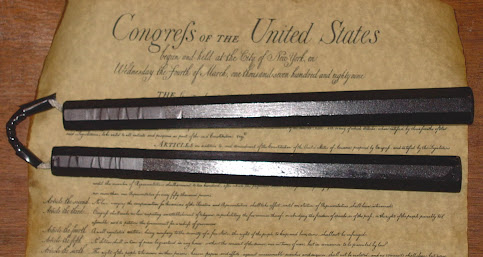
It is widely accepted as historical fact that the nunchaku was adapted for use as a weapon by the people of Okinawa as part of the development of karate during the early 17th Century, after the Japanese invaded the island in 1609 and banned the possession of traditional weapons such as sword and spear. See Stephen P. Halbrook, “Oriental Philosophy, Martial Arts and Class Struggle,” 2 Social Praxis 135, 139 (1974) (noting that the invading regime “banned all weapons but its own and brutally suppressed the population” and that a “people’s revolutionary movement organized clandestinely, and its activities centered around the development of karate for peasant self-defense against the imperial dictatorship”). See also George H. Kerr, Okinawa: The History of an Island People 156-160 (1958) (discussing the invasion).
To suppress the possibility of internal dissent in a type of abuse of power familiar to the American founding fathers from English history, the invading Japanese prohibited the conquered Okinawans from carrying or possessing weapons. See Halbrook; see also Paul Crompton, The Complete Martial Arts 63 (1989). In response, martial-arts systems were developed using non-prohibited items such as farm tools. Nunchaku were among those improvised weapons, evolving from a rice-threshing device or from a crude bridle for an agricultural beast of burden. Although nunchaku can be used offensively, it originated as and is utilized by modern martial artists primarily as a means of self-defense. See, e.g., State v. Muliufi, 64 Haw. 485, 643 P.2d 546, 549 (1982) (noting that “nunchaku [were] originally designed as a farmer’s tool [that] developed into a defensive weapon against the samurai’s sword”); Crompton at 140. Unsurprisingly, nunchaku are also currently used by over two hundred police forces across the United States for control of and/or self-defense against unarmed attackers or even those wielding knives. [2018 UPDATE: In recent years, due to the rising popularity of tasers among police departments, their use of nunchaku (specifically the Orcutt Police Nunchaku, which is effective at controlling suspects without injury) has declined somewhat.]
But in two states, California and New York, ordinary citizens may not even keep nunchaku in their own homes for peaceful martial-arts practice or home defense. Let's take a look at New York...
[UPDATE: On December 14, 2018, New York’s nunchaku ban was held unconstitutional in Maloney v. Singas. See “The Eighth Post,” above.]








